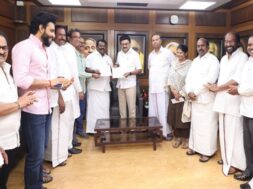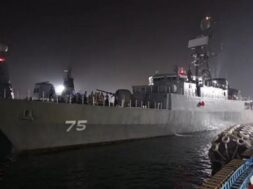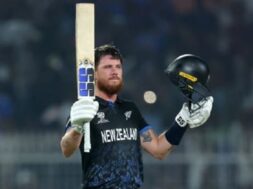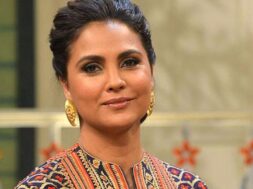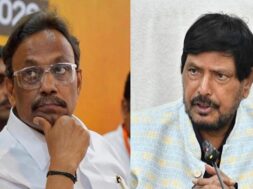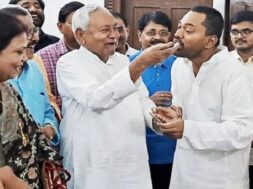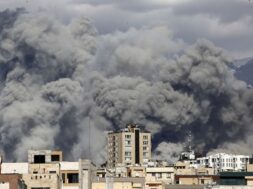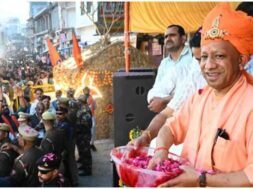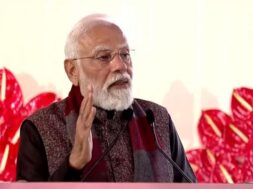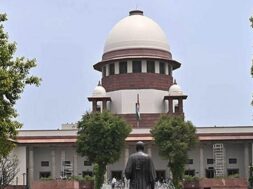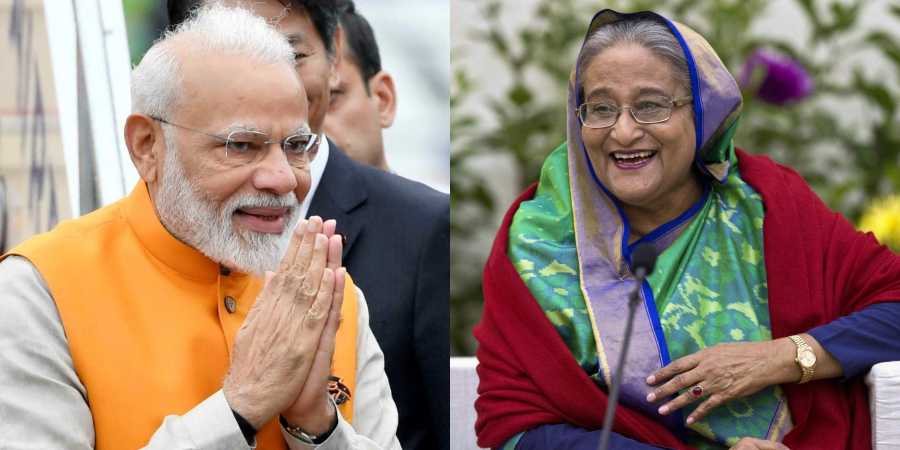
Manas Dasgupta
DHAKA, Mar 26: In his first foreign trip since the outbreak of Corona pandemic last year, the Prime Minister Narendra Modi on Friday arrived in Dhaka on a two-day visit to Bangladesh and paid rich tributes to the martyrs of the Bangladesh Liberation War of 1971 at Dhaka’s National Martyrs Memorial.
Speaking on the occasion, Modi said the sacrifice of the participants in the historic war will remain a lasting legacy in South Asia. Modi reached the memorial soon after landing at Dhaka’s Shahjalal International Airport where he was received by Prime Minister Sheikh Hasina and her council of ministers.
“I pray that the eternal flame at Savar, remains a lasting reminder of the noble victory of truth and courage over deceit and oppression,” wrote Prime Minister Modi at the Visitor’s Book at the memorial which is located 35 km away from Dhaka. The Indian leader also planted an ‘Arjun’ sapling at the memorial grounds which contain the unmarked graves of the martyrs.
“This is one of the most memorable days of my life. I am grateful that Bangladesh has included me in this event,” he said. He congratulated the people of Bangladesh for its 50th year of Independence and said one of the first protests of his political career was for the freedom of the neighbouring nation.
“The freedom struggle of Bangladesh was a significant moment in my journey too… My colleagues and I had done a satyagraha in India… I was in my early twenties. I even had the opportunity to go to jail during this satyagraha for Bangladesh’s struggle for freedom,” he said.
“We will never ever forget the sacrifice the soldiers of this great nation have made and also those by Indians who stood beside the soldiers of Bangladesh… we have not forgotten their bravery and courage…. we will never forget it,” he said.
Earlier, Modi and Bangladesh Foreign Minister AK Abdul Momen held talks in the Bangladesh capital.
It was also the first time Modi travelled to Dhaka on the newly-inducted custom-made Boeing 777 aircraft. He wore his mask before alighting from the aircraft and exchanging pleasantries with Ms. Hasina. He received a guard of honour at the airport.
The B777 aircraft, which has registration number VT-ALW, was delivered by Boeing to the Indian government in October last year. The aircraft, which has call sign AI1 or Air India One, departed from Delhi around 8 am and landed at the Dhaka airport around 10.30 a.m. on Friday, government officials said.
Another custom-made B777 aircraft, with registration number VT-ALV, was also delivered by the American aircraft giant to the Indian government in October last year. Both custom-made planes are to fly only president, vice president and prime minister of the country.
These two aircraft were part of Air India’s commercial fleet for a few months in 2018 before they were sent back to Boeing for retrofitting for VVIP travel. The B777 planes have state-of-the-art missile defence systems called Large Aircraft Infrared Countermeasures and Self-Protection Suites.
Beginning his interactions, Prime Minister Modi met with the leaders of the ruling alliance in Dhaka and interacted with a delegation of the Muktijoddhas or former guerrillas who fought in the war of 1971. He also met with the leaders of the religious minorities of Bangladesh.
In the afternoon, the visiting leader will participate at the National Day Programme alongside Prime Minister Sheikh Hasina. This will be followed by the inauguration of Bapu Bangabandhu Digital Video Exhibition. In the evening, the two leaders will be the chief guests at a concert by classical musician Ajoy Chakraborty.
During Modi’s visit he will attend the celebrations of the golden jubilee of the country’s independence, the birth centenary of ‘Bangabandhu’ Sheikh Mujibur Rahman and hold talks with his counterpart Sheikh Hasina.
Modi in a special article published in a leading daily in Dhaka on the eve of his visit to the neghbouring country had in a nutshell given an indication of the high esteem India held the friendship with Bangladesh.
Modi wrote about a joint march towards a golden future where people could “study, work, do business effortlessly across the subcontinent”. He also talks about resolving complex bilateral issues “in a spirit of good neighbourliness”.
India and Bangladesh have made good progress in connectivity, says the PM, referring to plans like Bangladeshi barges travelling all the way to Varanasi in Uttar Pradesh.
“Cargo from Bangladesh can move to Nepal and Bhutan through India. We are in the process of implementing a similar arrangement for Indian cargo to reach India’s North Eastern States through Bangladesh. We are making concerted efforts to operationalise our inland waterways, which will allow Bangladesh barges to reach all the way to Varanasi and Sahibganj in India.”
He talks about the completion of projects like the India-Bangladesh Friendship Pipeline and the Akhaura-Agartala rail link.
The Prime Minister also paid rich tribute to Sheikh Mujibur Rahman, Bangladesh’s first President and the father of Bangladesh Prime Minister Sheikh Hasina, writing on how the subcontinent would have evolved had “Bangabandhu” not been assassinated in 1975. Sheikh Mujibur Rahman was killed along with most of his family members at his home. His daughters, Sheikh Rehana and Sheikh Hasina survived because they were abroad.
“It is a safe bet that with Bangabandhu at the helm, Bangladesh and our region would have evolved along a very different trajectory,” PM Modi writes.
Talking about Bangladesh rising from the ashes of a painful war at the time, he says: “If this had continued, perhaps India and Bangladesh could have achieved many decades ago some of the accomplishments that we were able to reach only recently… For instance, India and Bangladesh were able to finally overcome the complications of history through the 2015 Land Boundary Agreement. It was a historic moment in the history of modern nation-states. But had Bangabandhu been at the helm longer, this achievement may have come much earlier.”
The Prime Minister says the two countries could have built a closely integrated economic region, with deeply interlinked value-chains spanning food processing to light industry, electronics and technology products to advanced materials and set up mechanisms to share meteorological, maritime and geological data to protect against the impact of natural disasters.
“Most of all, imagine a scenario wherein our people could study, work, and do business effortlessly across this subcontinent-the world’s largest pool of young people joining their energies to create wealth, innovation and drive new technologies. This would have been the most natural vaccine against the toxic infusion of radicalism, violent extremism and hatred in our societies,” writes PM Modi.
“And yet today, it is possible in this dawn of a new and rising Bangladesh to believe that this future is once again within our grasp. With growing income and prosperity, Bangladesh is progressively realising the dream of Bangabandhu, under the able leadership of Prime Minister Sheikh Hasina. It is time to once again chart a bold ambition for our partnership, as Bangabandhu would have done. With the spirit and enterprise of our people as our Bhagya Vidhata, the dispenser of our shared destiny, such a future is closer than ever,” he said.
The Prime Minister also handed over the Gandhi Peace Prize 2020 to Bangabandhu Sheikh Mujibur Rahman’s younger daughter. “It is a matter of pride for Indians that we got the opportunity to honour Sheikh Mujibur Rahman with Gandhi Peace Prize. I also salute the brave soldiers of the Indian Army who stood with the brothers and sisters of Bangladesh in the ‘Muktijuddho’ (Liberation War). I am happy to see them present at this event today,” he added.
Bangladesh Prime Minister Sheikh Hasina thanked Prime Minister Modi for being a part of the event amid the pandemic and said India was one of Bangladesh’s best development partners.
She said India was not only a neighbour, “we have a historical, social, cultural heritage and geographical rapport. The people and government of India were immensely involved in the evolution process of Bangladesh during our liberation war in 1971,” she said.
She said India sheltered about 10 million people who fled from Bangladesh in the face of persecution by Pakistani soldiers, in the face of killing, genocide and rape. India gave them shelter, food and medication. They helped our freedom fighters with all types of cooperation, Sheikh Hasina said.
“By the joint operation of India-Bangladesh allied forces, the final victory was achieved on 16th December, 1971. A notable number of Indian soldiers sacrificed their lives along with our freedom fighters and attained martyrdom. I remember their sacrifice with great honour,” she added.
She regretted that after killing Bangabandhu, the people who grabbed power had tried to wipe out his name from the minds of the people. “We can only say that without a principle, without history, a nation can’t progress,” Sheikh Hasina said. She added that she remembers with great anguish 15th Aug 1975 — a dark night for Bangladesh when the Father of Nation was assassinated. “My mother, 3 brothers, 2 sisters-in-law and uncle were brutally killed,” the Prime Minister said.
Thanking Modi for awarding the prestigious Gandhi Peace Prize 2020 to Sheikh Mujibur Rahman, Sheikh Hasina said, “On this very auspicious moment, I must say India indeed honoured a worthy leader of south Asia and a real follower of Gandhiji through this award.”
